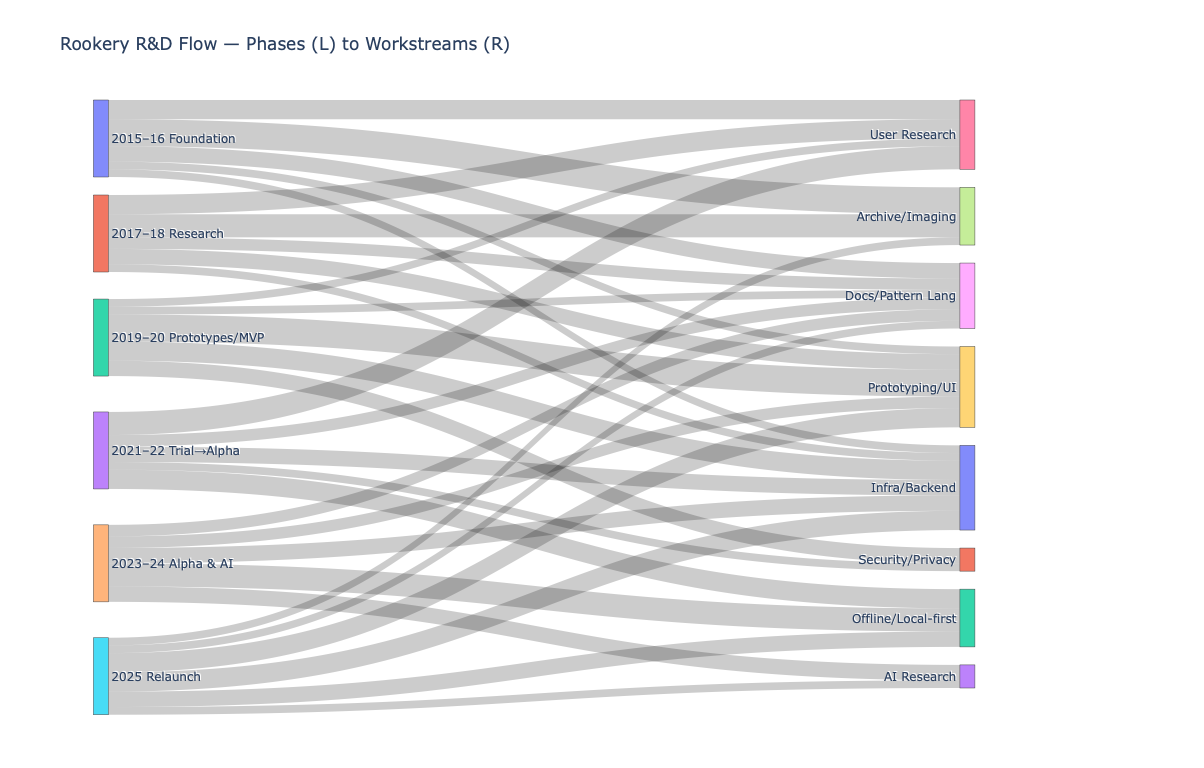Research & Development Timeline
2015 - Foundation
Highlights: American Cyborg established; archival practice begins. Four community salons; first loan agreements and sales records; early spreadsheet + image folder workflow; initial art index.
Takeaway: Spreadsheets scale poorly for heterogeneous artwork data-seed of the software idea.
2016 - Market Research
Highlights: Deep literature review (design, cities, visualization, human factors, sprint methods). Interview series with archivists, artists, librarians, collectors, and a developer.
Takeaway: Validated need for a long-lived, privacy-respecting, flexible archive for at-home collectors.
2017 - Initial Investment & Prototyping
Highlights: Bluebird prototypes Rookery; Finch interviews users and confirms demand; Starling handles legal/financial setup and founding docs; LLC formed; multi-year funding secured.
Problems: Images vs. spreadsheets don't mesh; privacy on image hosts; photographing art is hard.
Strategies: Test existing tools, assemble experts, formalize the company.
2018 - Experiments & Archive Building
Highlights: Condor photographs ~200 works; team refines handling/lighting and rapid cataloging; automation from camera to database tested. Bluebird & Starling compile binders (hi-res print + infosheet + receipts).
Ecosystem: Cardinal builds brand system; Raven establishes internal documentation and QR-code office automations; Owls produce works to index (ground-truthing the workflow).
Takeaway: Repeatable capture + indexing methodology established.
2019 - Research & Prototypes
Highlights: Flamingo builds 3D/VR/AR prototypes; "Robin" persona created; demo produced (dir. Flamingo, anim. Toucan, score Raven, narration Pelican). Technical plan by Glowbox; design/build partner engaged; weekly design iterations begin.
Problems: Too many competing approaches; limited industry-standard coding depth; unclear pricing.
Strategies: Structured design sprints; publish demo; interview coders.
2020 - MVP Build
Highlights: Partner firm codes the MVP (rooms-based UX; desktop web app with smartphone capture). Cybersecurity team hardens the system. MVP handed off; Raven produces a Developer Roadbook; Bluebird writes a screen-by-screen User Handbook.
Problems: Desire for local/off-cloud storage vs. cloud norms; inconsistent naming; COVID derails in-person demos.
Strategies: Security first; enforce naming conventions; slow down to reassess.
2021 - MVP Trial & Evaluation
Highlights: Social media experiments; live software recordings; structured user interviews by Finch; video + transcripts captured.
Log-in friction; microservice sprawl into maintenance burden; sparse code documentation.
Strategies: Hands-on user testing; compare stacks/providers; map and document the codebase.
2022 - Pivot to Alpha
Highlights: Bluebird synthesizes interview findings into fixes/features; new developer (Pitirre) onboarded; local-dev docs co-authored; offline USB version built; new repo with Wiki + Issues; parallel content/gallery/audio work; bug-fixing pass.
Problems: Ethical concerns with cloud services; complex DB architecture; weak financial models to emulate.
Strategies: Talk to early adopters; read every line of code; track labor meticulously.
2023 - Alpha Architecture
Highlights: Pattern Language formalized (Semantics/Syntax/Logic: Threshold, Lobby, Rooms, etc.); backend strategy + Firebase exploration; home server trials (Mac Mini, intranet); new screen prototypes.
Takeaway: Foundation for a documented, consistent, local-first architecture.
2024 - AI Research & Reflection
Highlights: Multi-year scan of AI landscape; experiments with conversational/visual models; critical review of risks and hype.
Problems: Increasingly hostile/opaque tech ecosystem; financing models lacking; "AI" often marketing-driven.
Strategies: Empower user data autonomy; explore alternative funding; consume tech selectively and critically.
2025 - Relaunch & Expansion
Highlights: Rookery relaunches as a self-teaching HTML hub, recommitting to getting users off the cloud. Phoenix builds a color engine. Ongoing front-end and back-end design experiments.
Takeaway: Education + local-first tools as the core path forward.


